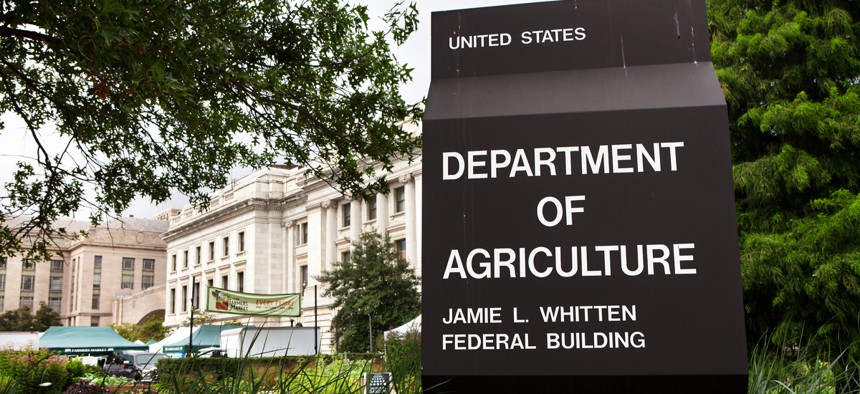
Mark Van Scyoc / Shutterstock.com
Analysis: Michael Lewis’s New Book About Trump is a Convincing Ode to Big Government
"The Fifth Risk" comes out Oct. 2.
Outside the headlines that stream endlessly, about Trump’s possible ties to Russia, his Supreme Court nominee’s alleged sexual assault, his advisors falling one by one, his ongoing buffoonery, there is an invisible meltdown happening in the most wonkish and important parts of the federal government—and it’s putting the country and the world in danger.
In his new book, The Fifth Risk, out Tuesday (Oct. 2) from W.W. Norton, Michael Lewis writes not so much about Donald Trump as all the people whose work is at risk of being lost or destroyed if Trump’s administration continues its campaign against good science. The bestselling author of Moneyball and The Big Short paints a convincing portrait of a federal government, already sprawling, stymied, misunderstood, and mismanaged, in even more peril under this administration.
He also does much to celebrate its many unseen heroes and achievements.
Lewis’s federal government is a noble one. It’s full of well-intentioned researchers motivated by public good and strong data, and there’s not a middling bureaucrat in sight. (Even former New Jersey governor Chris Christie looks good.) Lewis writes about Ali Zaidi, the young Pakistani American who went to Harvard an impassioned Republican and came out the other side applying for a job in the Barack Obama administration, and Kathy Sullivan, the oceanographer who became a NASA astronaut and then went on to become a high-ranking official in the National Oceanic and Atmospheric Administration. They’re dedicated civil servants who believe in the potential of a functioning federal government.
The book, which combines two features Lewis wrote for Vanity Fair and an audiobook he produced with Audible, extolls the virtues of the government at its best: The weather data we get from our apps? Thank NOAA. The fact that there aren’t more geese crowding American airports? Thanks, US Department of Agriculture. The reason eastern North Carolina didn’t get obliterated by a rogue hydrogen bomb in 1961? Safety mechanisms built by the Department of Energy.
A typical factoid, about what the USDA has achieved: “In 1872, the average American farmer fed roughly four other people; now the average farmer feeds about 155 other people… In 1950, the average cow yielded 5,300 pounds of milk. In 2016, the average cow yielded 23,000 pounds of milk.” A cow named Gigi, Lewis writes, produced nearly 75,000 lbs (34,019 kg) of milk in a recent year, or 24 gallons a day.
It’s not as if the federal government was some magically efficient beacon of transparency before Trump. “Dysfunction is baked into the structure of the thing,” Lewis writes, “The subordinates know that their bosses will be replaced every four or eight years, and that the direction of their enterprises might change overnight—with an election or a war or some other political event.” So it’s imperative that when new presidents come in, they are ready with a strong transition team that tries to quickly understand the agencies they’re taking over.
That didn’t happen with Trump’s win.
Lewis describes the people working in the DOE, a deeply complex and far-reaching agency, who were ready with binders of information on Nov. 9, 2016. The department maintains and protects the US’s nuclear arsenal, provides low-interest loans to encourage corporate innovation, and cleans up nuclear waste, among many other things. Eight years earlier, Lewis writes, Obama had sent 30 or 40 people to the department the morning after he was elected to understand what it does. On that day in 2016, no one came. Nor the day after.
When Trump people did finally show up at the DOE, says Lewis, they seemed primarily concerned with finding out who in the department had shown an interest in learning more about climate change—so they could be culled.
Perhaps more alarming than willful ignorance, though, is greed. In a chapter on weather forecast data, Lewis suggests that the long-unconfirmed nominee to head NOAA, Barry Myers, also the CEO of Accuweather, seeks to bury what is currently free public weather data, to make more money for private weather companies. “The dystopic endgame is not difficult to predict: the day you get only the weather forecast you pay for,” he writes.
The Fifth Risk, at a slim 220 pages, is a fast and riveting read, peppered occasionally with footnotes that throw unsubtle shade at Trump. Its characters seem ready for the big screen (“guys whose ties don’t match their suits,” “passive nerds”), as do the drab government-agency hallways Lewis romanticizes (“a lab experiment to determine just how little aesthetic stimulation human beings can endure”).
The book isn’t cohesive, and that’s perhaps not a bad thing. It means that the future of the federal government under Trump is yet to come, that the narrative isn’t over, and there’s still time to put the ship back on its course, shaky as it was. Because the titular “fifth risk” is that unknown, the “existential threat that you never really even imagine as a risk”—it’s maybe Trump, or a tornado that blasts through your house, or a lost nuclear bomb. It’s the unimagined thing that hasn’t happened yet, and so is hard to write news stories about, or invest in, or lobby for. So all you can do is describe the process of trying to know, and the people who protect it.






